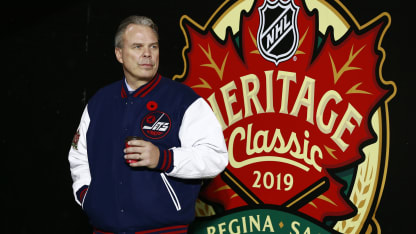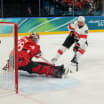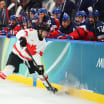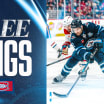"We've had conversations with all our UFAs agents at various different degrees and levels," said Cheveldayoff. "We'll continue to have those discussions with them as we move forward here. We're hopeful we have the opportunity to bring some of them back."
In addition to those UFAs, the Jets have also extended qualifying offers to six restricted free agents in the organization: Mason Appleton, Jansen Harkins, Jack Roslovic, C.J. Suess, Sami Niku, and Nelson Nogier.
With the salary cap staying put at $81.5 million, Cheveldayoff will be making sure any steps the team takes into free agency are cautious ones.
"When you're signing players to more than one year, you have to take those situations in to consideration as well," said Cheveldayoff. "With no new money coming into the system, years of signing contracts with the thought process in the past that, 'well the cap is going to go up' we know that's not a reality right now. We'll see how that plays in the marketplace."
The Jets do have some space to move in that marketplace. Cheveldayoff believes this is one of the first opportunities the Jets have had to attempt to fill the spot on the blue line left by Dustin Byfuglien.
But Cheveldayoff also said he plans to have a conversation with Jets centre Bryan Little in the next few days. Little hasn't played since November 5 after taking a Nikolaj Ehlers slap shot to the ear, resulting in a perforated ear drum.
Little's condition and plans going forward will play a role in the decisions Cheveldayoff makes.
"When you get into a team situation like ours - where you're going to be a team that is either at the cap or close to the cap and has to use LTIR if that becomes a situation for us - the cap changes," said Cheveldayoff. "The dynamics of how you actually have to use the cap does change."
As he tries to add to the roster (despite the 2020-21 season's start date being unknown), Cheveldayoff feels the Jets have a lot of assets going for them that could make the team an attractive spot.
"I think we have a real strong core. You look at the talent we have in the top end of our forward group and it's very strong. You look at our goaltending situation, obviously it's very strong," he said. "There is obviously desires to be active in the free agent market and desire to potentially be active in the trade market if something is there that we feel makes our organization better.
"But the lure of just simply relying on free agency where lots of money and lots of term gets thrown around at those times - there is an impact that lasts beyond October 9 that you have to truly understand."
If all that isn't enough, Cheveldayoff has one more thing to keep in mind - Seattle.
The NHL's 32nd team, named the Kraken, are scheduled to play their first NHL season in 2021-22 and will acquire players through an expansion draft with the same rules as the Vegas Golden Knights had prior to the 2017-18 campaign.
Any signing or trade needs to have this in mind as well.
"It has to be at the forefront of your mind," said Cheveldayoff. "So if you're making a trade, what does that do to your protection situation? What does that do to the formation of your team? It's something that is certainly being discussed with every decision we're making."



















